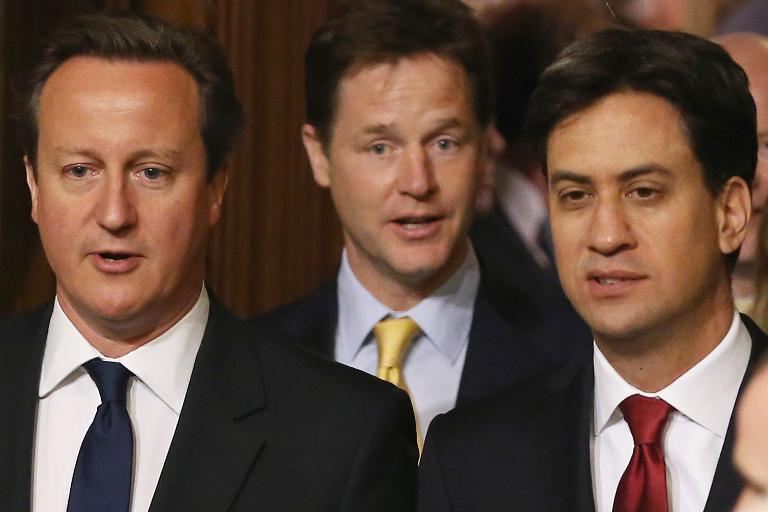
Those wishing to understand British politics ahead of next year’s General Election could do worse than consider the following two statistics. First, according to the current trend of polls, the combined vote share of the main two parties is lower than at any point since the Second World War.
In 1951 Labour and the Conservatives between them earned 96.8 percent of public support. A poll from Lord Ashcroft yesterday put their current combined vote share below 60 percent. Put simply, Labour and the Tories have declined massively as popular parties in recent years.
Second, over the last two years there has been a consistent, significant decline in Labour’s poll lead over the Tories. In May 2012, the average Labour lead among pollsters was 11 percent. By May 2013 it was 9 percent, in May 2014 it was 3 percent, and currently the average Labour lead is 1 percent. There is clear narrowing of public support between the two main parties going into the election.
What does this tell us about 2015? The decline of the Tory-Labour vote share has happened over many decades and many parliaments, but the current combined total languishing around the 60 percent mark shows that, more than ever, the main parties no longer capture the public’s imagination.
Six months out from the election, the Tories struggle to climb above 30 percent in the polls. Coupled with the unfortunate electoral arithmetic of constituency boundaries, there is almost no prospect of a Conservative majority next year. While David Cameron and George Osborne outpoll their opponents on the economy, the electorate does not feel inspired to return them to power.
Labour meanwhile, with its fabled “35 percent strategy” aimed at securing its core support, is struggling to even reach that base. In terms of personal leadership ratings, Ed Miliband is now less popular than Nick Clegg. Last week the Labour leader reached a 33 month low in his personal ratings. Over the weekend he broke his own personal worst. Labour’s plunging poll lead reflects that. Increasingly, even figures within his own party realise that Miliband has failed to motivate voters, or even galvanise his own grassroots.
Unlike almost every election prior to this one – 2010 the most notable recent exception – the public feels no great sense of support for any of the main parties or their leaders. Of the minor parties Nigel Farage boasts the best personal leadership ratings, but even the UKIP leader doesn’t manage a positive net approval rating these days. Each of our leaders and each of our parties have been unable to convince us that they are the right people for the job.
As the old parties decline and the new parties rise, a more European form of government, made up of broad coalitions of Right and Left, could be a good thing for the Right. It has long been a myth that there is a natural Left-of-centre majority in the UK. Looking at current poll trends, a Left coalition of Labour, the Lib Dems, the Greens and the SNP would likely fall short of 50 percent. A post-election Right coalition of the Tories and UKIP may well form a majority. Such coalitions between conservative parties and populist Right parties have existed historically in Scandinavian countries in particular. Might that be the future for the British Right?
One thing is clear: a Conservative Party majority next year is all but impossible. Tory politicians making promises conditional on a majority are being disingenuous. If current trends continue, pre-election ‘guarantees’ could become obsolete.

COMMENTS
Please let us know if you're having issues with commenting.